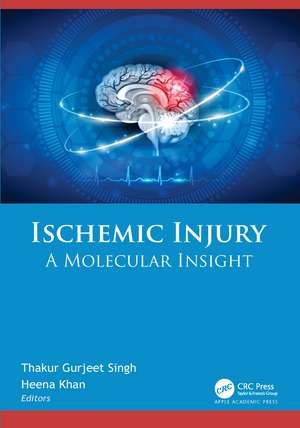Ischemic Injury: A Molecular Insight
Editat de Thakur Gurjeet Singh, Heena Khanen Limba Engleză Hardback – 22 noi 2024
This new volume addresses this epidemic by presenting detailed studies on ischemic injury, with emphasis on the molecular-level mechanisms and the role of signaling pathways in the body, their structure, and their mechanism of action. The book focuses on molecular pharmacology plans and explains the new areas of research on the discovery of therapeutic molecules that can be used for combating this life-threatening disease. The authors discuss stroke occurrence at different stages of life as well as sex-based differences in its treatment. They cover aspects of the clinical treatment and diagnosis of patients with cardiovascular events, including in-depth information on the prevention, evaluation, therapy selection, result projection, and long-term course of the disease in affected patients. They also detail the involvement of platelets, neurotransmitters, renin-angiotensin-aldosterone system, and vitamin D in ischemic injury.
Preț: 1630.26 lei
Preț vechi: 1716.07 lei
-5% Nou
Puncte Express: 2445
Preț estimativ în valută:
311.95€ • 326.53$ • 259.64£
311.95€ • 326.53$ • 259.64£
Carte tipărită la comandă
Livrare economică 31 martie-14 aprilie
Preluare comenzi: 021 569.72.76
Specificații
ISBN-13: 9781774915400
ISBN-10: 1774915405
Pagini: 564
Ilustrații: 162
Dimensiuni: 178 x 254 mm
Greutate: 1.2 kg
Ediția:1
Editura: Apple Academic Press Inc.
Colecția Apple Academic Press
ISBN-10: 1774915405
Pagini: 564
Ilustrații: 162
Dimensiuni: 178 x 254 mm
Greutate: 1.2 kg
Ediția:1
Editura: Apple Academic Press Inc.
Colecția Apple Academic Press
Public țintă
Academic and PostgraduateCuprins
1. Stroke Insight 2. Myocardial Ischemic-Reperfusion Injury 3. Preclinical and Clinical Aspects of I-R Injuries 4. Molecular Aspects of Ischemic-Reperfusion Injury 5. Role of Mitochondria in Ischemic-Reperfusion Injury 6. Stroke Effect in Daily Life and Therapeutics, Complications for Prevention of Stroke 7. Etiopathogenesis and Molecular Targets in Cerebral Ischemia: Current Understanding of Stroke and Therapeutic Approaches 8. Expatiating the Pivotal Role of Matrix Metalloproteinases and Blood-Brain Barrier Disruption in Ischemic Stroke: Molecular Insights and Therapeutic Targets 9. Acute Ischemic Stroke in COVID-19 Patients 10. Neurotransmission Imbalance: A Major Factor in the Worsening of Ischemic Injury 11. Role of the Renin-Angiotensin-Aldosterone System (RAAS) in Amelioration of Stroke Pathophysiology 12. Stroke and Diabetes in Vitamin D Deficiency: Prospects of Intertwined Pathobiologies 13. Remote Ischemic Post-Conditioning: An Overview 14. Sex-Based Differences in Acute Kidney Injury: Lessons from Renal Ischemia-Reperfusion Injury Model in Rodents 15. Critical Overview of Conditioning Techniques and Their Current Status in the Treatment of Myocardial Ischemia-Reperfusion Injury 16. Involvement of Platelets in Myocardial Ischemia and Reperfusion Injury 17. Recent Advancements in Strategies for Treatment of Cerebral Ischemia 18. Recent Therapeutic Approaches Toward the Management of Ischemic Heart Disease 19. Nanotechnology-Assisted Treatment for Ischemic Heart Disease and Recent Patents 20. Major Risk Factors Involved in the Pathobiology of Ischemic Brain and Heart Disorders 21. Modulating Mitogen-Activated Protein Kinase (MAPK) Downstream Signaling Pathways in Cerebral Ischemic Hemorrhages 22. Implication of Mitogen-Activated Protein Kinase (MAPK) in Cerebral Stroke 23. Regulation of JNK Signaling Pathway in Ischemia-Reperfusion Injury 24. Role of Glycogen Synthase Kinase-3? (Gsk-3?) in Intracranial Haemorrhage 25. Role of GSK-3 Inhibition in Modulating the Pathology of Stroke 26. Regulation of NRF-2 Signaling Pathway in Ischemia-Reperfusion Injury 27. Regulation of PI3K-AKT Signaling Pathway in Ischemia-Reperfusion Injury 28. COVID-19 and Ischemic Stroke: Advancements and Challenges
Notă biografică
Thakur Gurjeet Singh, PhD, MPharm, has 16 years of experience in industry, research, and teaching. He is currently Dean of the Chitkara College of Pharmacy, Chitkara University, Punjab, India. He is engaged with projects on interception of nicotine, morphine, alcohol dependence, ischemia, diabetic neuropathy and nephropathy toxicology, epilepsy, Alzheimer’s disease, and stem cell research studies. He has attended UGC networking courses and various preclinical and clinical research training programs. A prolific author and researcher, he has many publications and patents to his credit. He has attended national and international conferences and has guided MPharm and PhD students. He is a reviewer for various highly reputed international journals. Dr. Singh is a member secretary of the Committee for the Purpose of Control and Supervision of Experiments on Animals and is the In-Charge of the animal house facility at the Chitkara College of Pharmacy.
Heena Khan, PhD, MPharm, has over five years of experience in research. She is working as a Research Fellow at Chitkara University, Punjab, India, where she is engaged with several projects on stroke, diabetes, Alzheimer’s disease, and Parkinson’s disease. She has more than 30 research and review publications to her credit and is a reviewer for several international journals. She has participated and attended several national and international conferences. She is also a member of the International Society for Pharmacoeconomics and Outcomes Research.
Heena Khan, PhD, MPharm, has over five years of experience in research. She is working as a Research Fellow at Chitkara University, Punjab, India, where she is engaged with several projects on stroke, diabetes, Alzheimer’s disease, and Parkinson’s disease. She has more than 30 research and review publications to her credit and is a reviewer for several international journals. She has participated and attended several national and international conferences. She is also a member of the International Society for Pharmacoeconomics and Outcomes Research.
Descriere
Discuses studies on ischemic injury, emphasising the molecular-level mechanisms and the role, structure and mechanism of signaling pathways in the body. It also explains research on various important topics including new therapeutic molecules to combat this disease, etiologies of ischemic and hemorrhagic stroke, complications etc.
